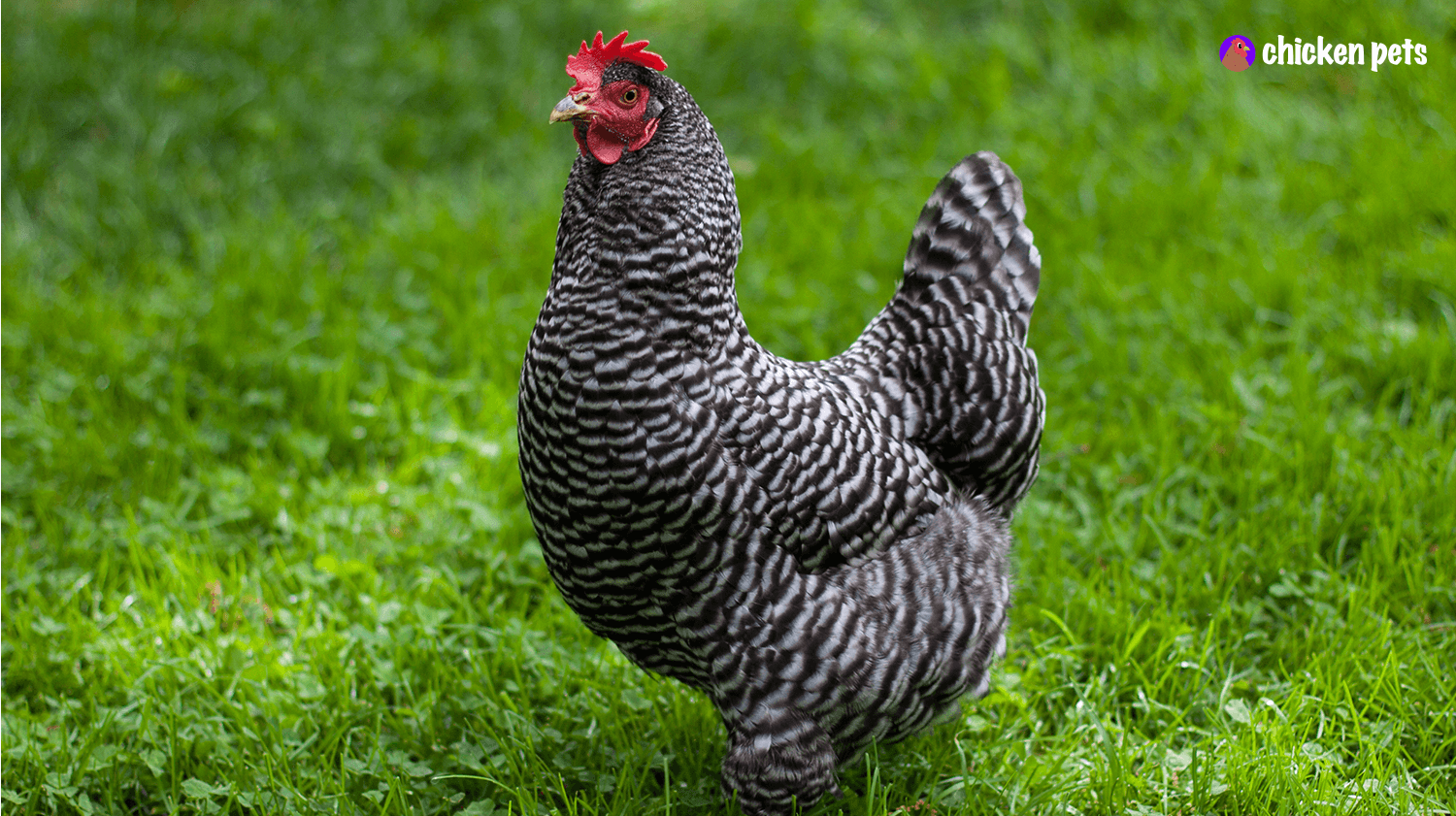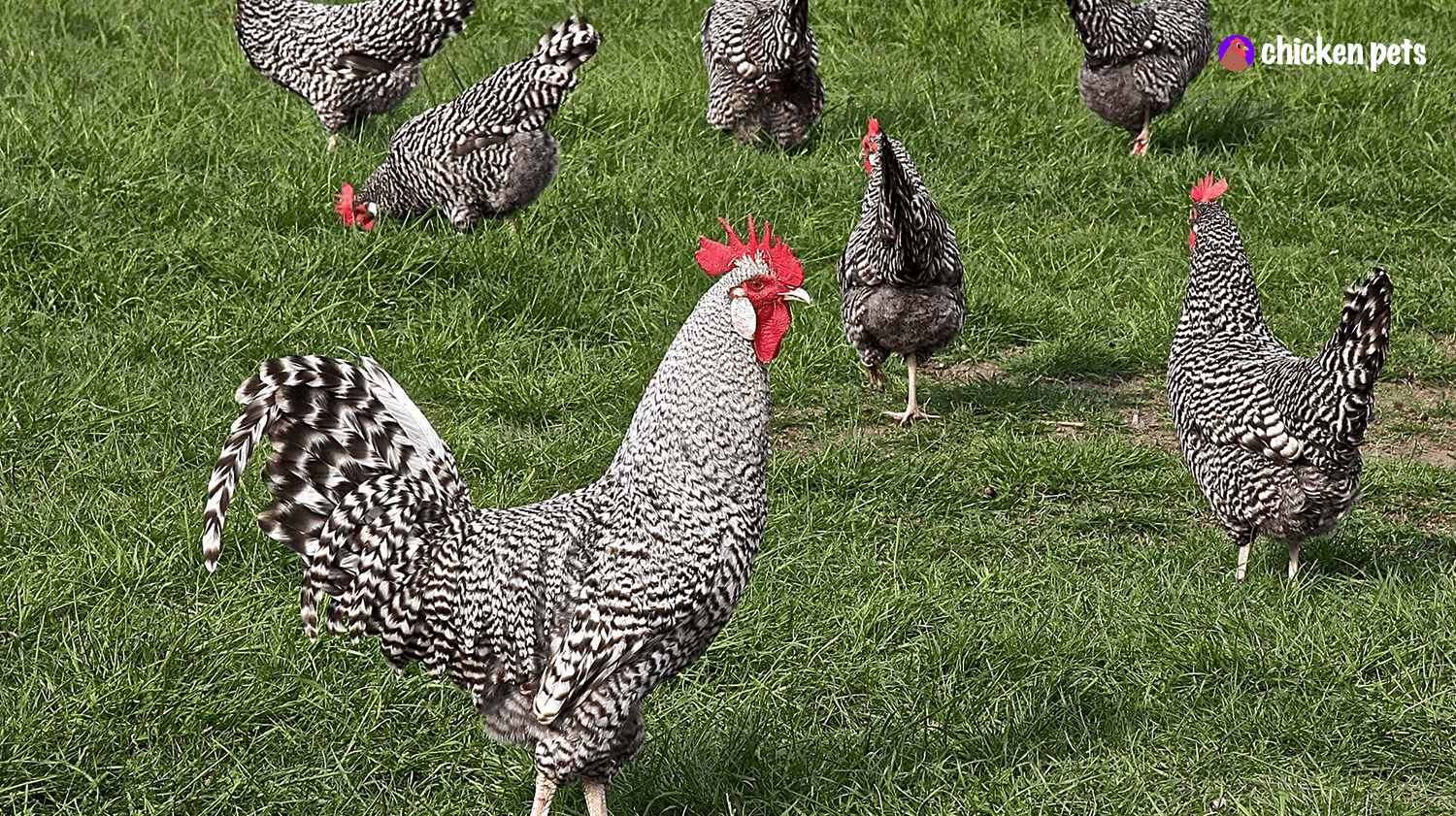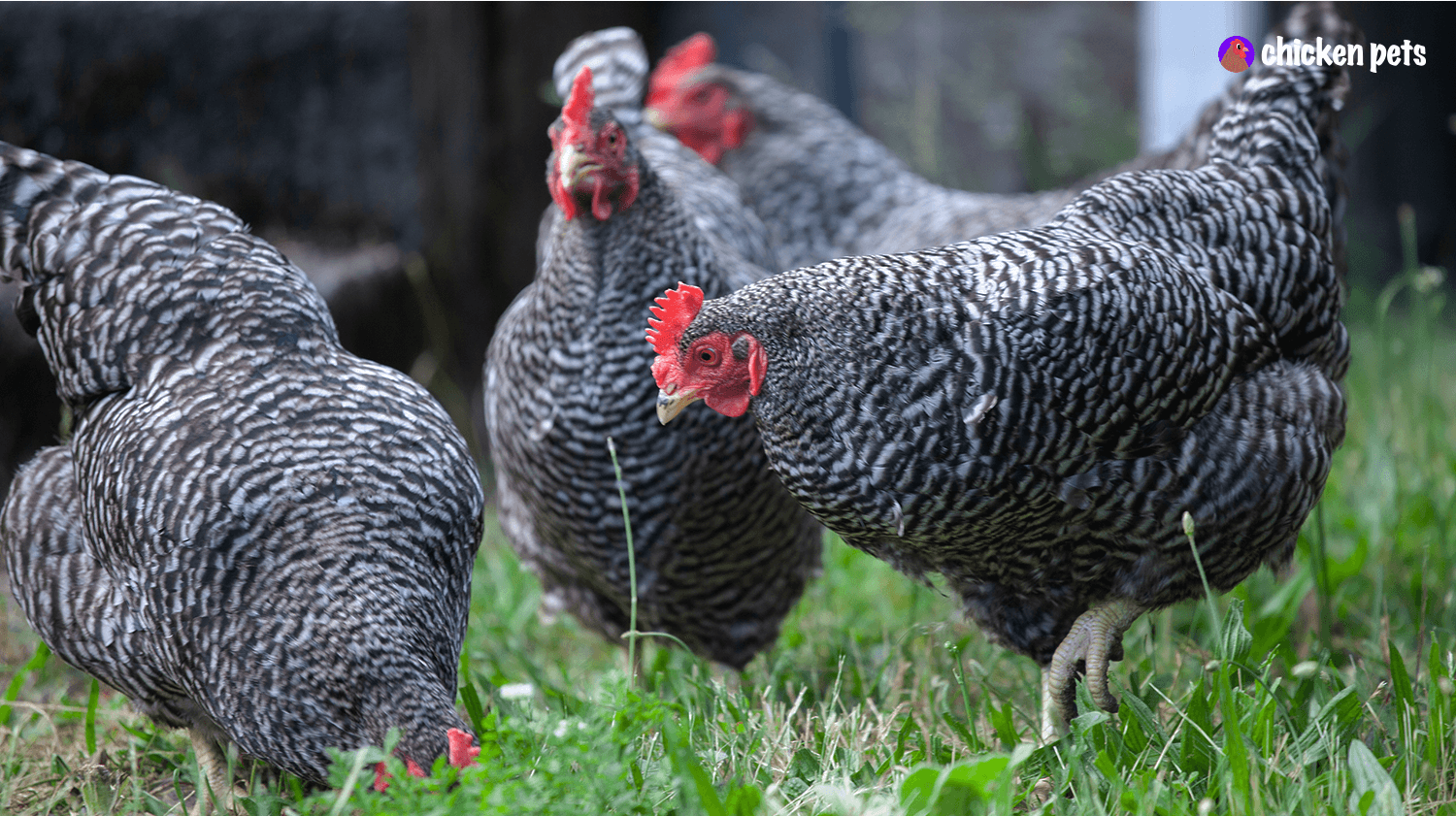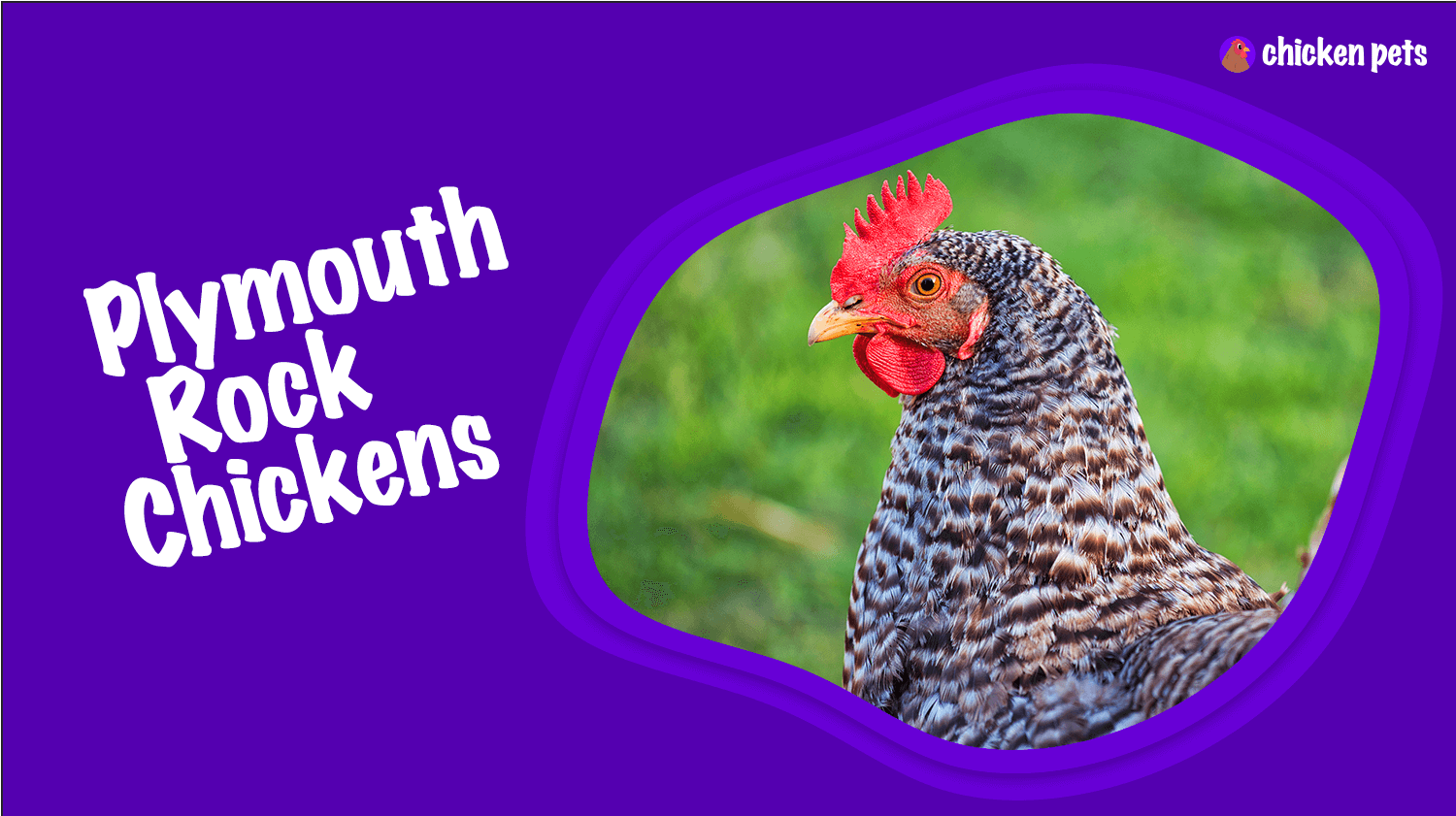What is a Plymouth Rock chicken?
Plymouth Rock chickens are a popular breed of chicken known for its dual purpose – they are both excellent egg-layers and have meat suitable for consumption. The breed was developed in the United States in the 19th century and is named after Plymouth, Massachusetts, where it was first exhibited.
Characteristics and appearance of Plymouth Rock chickens.
Plymouth Rock chickens are a medium to large breed, with roosters weighing around 8-10 pounds and hens weighing 6-8 pounds. They have a distinctive appearance: a large, rounded breast, a broad back, and a short, wide tail. The most common color variety of Plymouth Rocks chickens is a barred pattern, with alternating light and dark stripes on the feathers, but they can also be found in other colors such as black, white, and blue.
| Facts | Description |
|---|---|
| Breed type | Dual-purpose |
| Size | Medium |
| Egg production | Good |
| Egg color | Brown |
| Broodiness | Fairly good |
| Meat production | Good |
| Cold hardiness | Good |
| Heat tolerance | Good |
| Feather color variations | Barred, Buff, White, Cuckoo, Golden Cuckoo, Silver Penciled Blue |
| Weight | Roosters: 8-9 lbs, Hens: 6-7 lbs |
| Temperament | Docile, friendly |
| Lifespan | 5-8 years |
| Special care | None |
The egg-laying ability of Plymouth Rock chickens.

Plymouth Rock chickens are known for their excellent egg-laying ability. Hens of this breed can lay up to 300 eggs annually, making them a perfect choice for backyard chicken keepers who want a steady supply of fresh eggs. Their eggs are medium to large, with brown shells.
Temperament and personality of Plymouth Rock chickens.
Plymouth Rock chickens are generally docile and friendly, making them a good choice for backyard chicken keepers who want a pet chicken that is easy to handle. They are not known for being aggressive or territorial and tend to get along well with other chickens and humans.
How to care for Plymouth Rock chickens in your backyard.
Caring for Plymouth Rock chickens in your backyard is relatively easy. They will need a coop or chicken house to sleep in, lay their eggs in, and access a fenced-in area where they can roam and forage for food. They will also need a constant supply of food and water and will benefit from regular sunlight and fresh air access.
Pros and cons of having Plymouth Rock chickens as pets.
One of the main benefits of having Plymouth Rock chickens as pets is their egg-laying ability. This breed is an excellent choice if you want a steady supply of fresh eggs. They are also generally docile and easy to handle, making them a good choice for first-time chicken keepers.
On the other hand, Plymouth Rock chickens are a large breed, so that they will need more space and resources than smaller breeds. They are also not known for being exceptionally hardy or disease-resistant so they may be more susceptible to illness than some other breeds.
Types of Plymouth Rock Chicken Breeds.

The Plymouth Rock chicken is a popular and versatile breed that has been around for centuries. This breed is known for its hardiness, docile nature, and ease of care. Plymouth Rocks come in various color types, each with its unique characteristics.
The most popular types include the Barred Plymouth Rock, Buff Plymouth Rock, and White Plymouth Rock. Whether you’re looking for a backyard pet or a reliable egg layer, a Plymouth Rock breed is perfect.
In this section, we’ll take a closer look at some of the different types of Plymouth Rock chicken breeds and what makes each one special.
- Barred Plymouth Rock — This traditional chicken breed is known for its distinct black and white striped plumage. They are known to be friendly and easy to handle, making them an excellent choice for backyard flocks.
- Black Plymouth Rock — The Black Plymouth Rock is a hardy bird known for its rich, black feathers and calm temperament. They are considered to be great layers and are known to be an excellent addition to backyard flocks.
- Blue Plymouth Rock — Blue Plymouth Rock is a striking bird with unique blue-gray plumage. They are known to be docile and friendly, making them an excellent choice for families with children.
- Buff Plymouth Rock — The Buff Plymouth Rock is a beautiful bird with warm, golden-brown plumage. They are known to be hardy and easy to care for, making them an excellent choice for backyard flocks.
- Columbia Plymouth Rock — The Columbia Plymouth Rock is a hardy bird known for its unique black and white plumage. They are known to be excellent layers and are known to be a perfect addition to backyard flocks.
- Partridge Plymouth Rock — The Partridge Plymouth Rock is a unique bird with distinct black and white speckled plumage. They are known to be docile and friendly, making them an excellent choice for families with children.
- Silver Penciled Plymouth Rock — The Silver Penciled Plymouth Rock is a striking bird with a unique silver-gray plumage with black penciling. They are known to be docile and friendly, making them an excellent choice for families with children.
- White Plymouth Rock — The White Plymouth Rock is a pure white bird known for its docile nature and hardiness. They are excellent layers and are known to be a wonderful addition to backyard flocks.
- White-Laced Red Plymouth Rock — The White-Laced Red Plymouth Rock is a striking bird with a unique white plumage with red lacing. They are known to be docile and friendly, making them an excellent choice for families with children.
- Splash Plymouth Rock — The Splash Plymouth Rock is a unique bird with distinct black and white speckled plumage. They are known to be docile and friendly, making them an excellent choice for families with children.
- Lavender Plymouth Rock — The Lavender Plymouth Rock is a unique bird with distinct lavender plumage. They are known to be docile and friendly, making them an excellent choice for families with children.
- Blue Splash Plymouth Rock — The Blue Splash Plymouth Rock is a striking bird with a unique blue-gray plumage with white speckling. They are known to be docile and friendly, making them an excellent choice for families with children.
- Blue Partridge Plymouth Rock — The Blue Partridge Plymouth Rock is a unique bird with distinct blue-gray and black-speckled plumage. They are known to be docile and friendly, making them an excellent choice for families with children.
- Buff-Laced Plymouth Rock — The Buff-Laced Plymouth Rock is a striking bird with unique golden-brown plumage with black lacing. They are known to be docile and friendly, making them an excellent choice for families with children.
- Silver-Laced Plymouth Rock — The Silver-Laced Plymouth Rock is a striking bird with a unique silver-gray plumage with black lacing. They are known to be docile and friendly, making them an excellent choice for families with children.
- Columbian Plymouth Rock — The Columbian Plymouth Rock is a hardy bird known for its unique black and white plumage. They are known to be great layers and are known to be an excellent addition to backyard flocks. They are known to be docile and friendly, making them a perfect choice for families with children.
- Red Plymouth Rock — The Red Plymouth Rock is a striking bird with unique red plumage. They are known to be docile and friendly, making them an excellent choice for families with children. They are also known to be perfect layers and are known to be a wonderful addition to backyard flocks.
- Cuckoo Plymouth Rock — The Cuckoo Plymouth Rock is a unique bird with distinct black and white speckled plumage. They are known to be docile and friendly, making them an excellent choice for families with children.
- Golden Cuckoo Plymouth Rock — The Golden Cuckoo Plymouth Rock is a striking bird with unique golden-brown and white speckled plumage. They are known to be docile and friendly, making them an excellent choice for families with children.
- Silver Penciled Blue Plymouth Rock — The Silver Plymouth Rock is a striking bird with a unique blue-gray plumage with silver penciling. They are known to be docile and friendly, making them an excellent choice for families with children. They are also known to be beautiful layers and are known to be a perfect addition to backyard flocks.
Plymouth Rock chicken FAQs.

The Plymouth Rock chicken is a beloved and versatile breed that has been around for centuries. These birds are known for their hardiness, docile nature, and ease of care, making them a great addition to any backyard flock.
Whether you’re a seasoned chicken keeper or new to backyard chickens, you may have questions about Plymouth Rock chickens.
In this FAQ, we’ll cover all the basics of keeping Plymouth Rock chickens, from their size and diet to their egg-laying abilities and suitability as pets. Whether you’re thinking of adding a Plymouth Rock to your flock or are just curious about this popular breed, this FAQ has all the information you need to know.
How big do Plymouth Rock chickens get?
Plymouth Rocks are considered a medium-sized breed, with hens weighing around 5-6 pounds and roosters weighing about 6-8 pounds. They are larger than bantam breeds but smaller than some giant breeds.
What do Plymouth Rock Chickens eat?
Plymouth Rock chickens are not picky eaters and will eat various food, including commercial chicken feed, fruits, vegetables, and kitchen scraps. They also enjoy foraging for bugs and worms in the yard.
Do Plymouth Rock Chickens lay eggs?
Plymouth Rock chickens are excellent layers, producing around 200-280 eggs annually. They are known for their large, brown eggs, a favorite among backyard chicken keepers.
Are Plymouth Rock Chickens good pets?
Yes, Plymouth Rock chickens make great pets! They are friendly, docile, and easy to handle. They are also a hardy breed and can adapt to different climates.
How long do Plymouth Rock chickens live?
Plymouth Rock chickens can live for around 5-8 years with proper care.
Are Plymouth Rock Chickens prone to disease?
Like all animals, Plymouth Rock chickens can be prone to certain diseases. However, they are generally considered hardy and less susceptible to certain conditions than some other breeds.
How much does a Plymouth Rock chicken eat?
Plymouth Rock chickens will eat about 1/4 to 1/3 pounds of feed per day, depending on their size, age, and activity level.
Are Plymouth Rock Chickens noisy?
Plymouth Rock chickens are considered a relatively quiet breed. They make soft clucking sounds but are not as loud as some other breeds.
Do Plymouth Rock Chickens need special care?
Plymouth Rock chickens are a hardy and adaptable breed, and they do not require any special care beyond the basics of providing them with food, water, and a safe and secure coop.
What are Plymouth Rock chickens good for?
Plymouth Rock chickens are suitable for various things, including egg production, meat, and backyard pet. They are also a great addition to any backyard flock.
What to do if Plymouth Rock eggs hatch early?
If Plymouth Rock eggs hatch early, keeping the chicks warm and dry is essential. Ensure they have a heat source, such as a heat lamp, and provide them with food and water. Also, keep the chicks separate from the adult birds until they are big enough to defend themselves.
Is a Plymouth Rock chicken a dinosaur?
No, Plymouth Rock chickens are not dinosaurs, and they are a domesticated breed of chicken developed over time by selective breeding.
Are Plymouth Rocks suitable for beginner chicken keepers?
Yes, Plymouth Rocks are an excellent choice for beginner chicken keepers. They are hardy, easy to care for and have a friendly and docile nature. They are also a good choice for children as they are easy to handle and make great pets.
Do Plymouth Rocks need a lot of space?
Plymouth Rocks only require a tiny space, and they are comfortable in smaller coops and runs as long as they have enough room to move around and forage. However, it’s always best to give them as much space as possible.
Are Plymouth Rocks good with other animals?
Plymouth Rocks are generally docile and friendly birds and get along well with other animals, including chickens, ducks, and rabbits.
How do I introduce a Plymouth Rock into my existing flock?
When introducing a Plymouth Rock to your existing flock, it’s best to do it gradually. You can start by keeping the new bird in a separate coop or pen for a few days and slowly introducing them to the existing flock.
Do Plymouth Rocks need bathing, by chance?
Plymouth Rocks do not require regular bathing, but they do need to stay clean and dry to prevent disease and parasites. Could you make sure to keep their coop run clean and dry, and if they get dirty, you can give them a quick bath with warm water.
Are Plymouth Rocks good egg layers?
Plymouth Rocks are excellent layers, producing around 200-280 eggs annually. They are known for their large, brown eggs, a favorite among backyard chicken keepers.
Can I keep a Plymouth Rock chicken inside my house?
Keeping Plymouth Rock chickens inside your house is not recommended, as they are not domesticated animals and are not suitable for indoors. They need access to the outdoors and a coop to roost and lay eggs.
Do Plymouth Rocks require exceptional food?
Plymouth Rocks do not require exceptional food and will do well on a diet of commercial chicken feed and fresh fruits and vegetables.
Do Plymouth Rock Chickens need to be groomed?
Plymouth Rock chickens do not require regular grooming, but it’s a good idea to check their feathers and remove any debris or mites that may be present.
Are Plymouth Rock chickens high maintenance?
Plymouth Rock chickens are not considered high maintenance, and they are a hardy and adaptable breed that requires the primary care of providing food, water, and a safe and secure coop.
What color eggs do Plymouth Rocks lay?
Plymouth Rock chickens lay brown eggs.
Are Plymouth Rock chickens suitable for beginners?
Yes, Plymouth Rock chickens are an excellent choice for beginner chicken keepers. They are hardy, easy to care for and have a friendly and docile nature.
Do Plymouth Rocks like to cuddle?
Plymouth Rocks are not typically cuddly birds, but they enjoy being petted and come up to you for attention and treats.
Are Plymouth Rocks noisy?
Plymouth Rocks are not considered a boisterous breed, and they make soft clucking sounds but are quieter than some other breeds.
What is Plymouth Rock’s favorite food?
Plymouth Rock chickens are not picky eaters and will eat various food, including commercial chicken feed, fruits, vegetables, and kitchen scraps. They also enjoy foraging for bugs and worms in the yard.
Are Plymouth Rocks intelligent?
Plymouth Rocks are not considered particularly intelligent compared to other chicken breeds, but they are quick learners and can be trained to come when called and even perform simple tricks. They are also known to be very curious and enjoy exploring their surroundings.
Do Plymouth Rocks need heat in winter?
Plymouth Rocks are hardy birds that can tolerate cold temperatures but require adequate shelter and protection from the elements. During the winter, it’s essential to provide them with a warm and draft-free coop and ensure they have access to a heat source if temperatures drop below freezing.
Do Plymouth Rocks lay every day?
Plymouth Rocks are not known for being even layers, and their egg production can vary depending on their age, health, and seasons. However, they are considered good layers, producing around 200-280 eggs annually.
Can you bathe a Plymouth Rock chick?
It’s not recommended to bathe Plymouth Rock chicks as they are very delicate and can quickly become chilled or stressed. If they need to be cleaned, use a damp cloth or a soft-bristled brush to wipe off any dirt or debris gently.
How much is a Plymouth Rock chicken worth?
The price of a Plymouth Rock chicken can vary depending on the location, age, and sex of the bird. On average, Plymouth Rock chicks can cost around $3-$5 each, while adult birds can be priced at $10-$20.
How cold is too cold for Plymouth Rock chickens?
Plymouth Rock chickens are hardy birds that can tolerate cold temperatures but require adequate shelter and protection from the elements. During freezing weather, it’s essential to provide them with a warm and draft-free coop and ensure they have access to a heat source if temperatures drop below freezing.
Can you mix Plymouth Rocks with other chickens?
Yes, Plymouth Rocks are known to get along well with other chickens, and mixing them with other breeds can be a great way to create a diverse and exciting flock.
How hot is too hot for Plymouth Rock chickens?
Plymouth Rock chickens can tolerate hot weather, but they do require adequate shelter and protection from the sun. During scorching weather, ensure they have access to shade, fresh water, and an excellent resting place.
Do Plymouth Rocks need heat lamps?
Plymouth Rock chickens do not require heat lamps but adequate shelter and protection from the elements. During freezing weather, it’s essential to provide them with a warm and draft-free coop and ensure they have access to a heat source if temperatures drop below freezing.
What to do with Plymouth Rocks when it rains?
During heavy rain, it’s essential to ensure that your Plymouth Rock chickens have a dry and protected place to roost. Please ensure that the coop and run are secure and have a sound drainage system to keep the birds dry. If the weather is terrible, you can also bring them inside a garage or shed during the storm.
Is Plymouth Rock the right chicken breed for you?
Overall, Plymouth Rock chickens are a good choice for backyard chicken keepers who want a dual-purpose breed that is good at laying eggs and produces meat that is suitable for consumption. They are friendly and easy to handle, and they will provide a steady supply of fresh eggs.
However, they are a large breed and may not be as hardy or disease-resistant as some other breeds so they may require more resources and care. Plymouth Rock chickens can make excellent pets if you have the space and resources to provide for them.

















